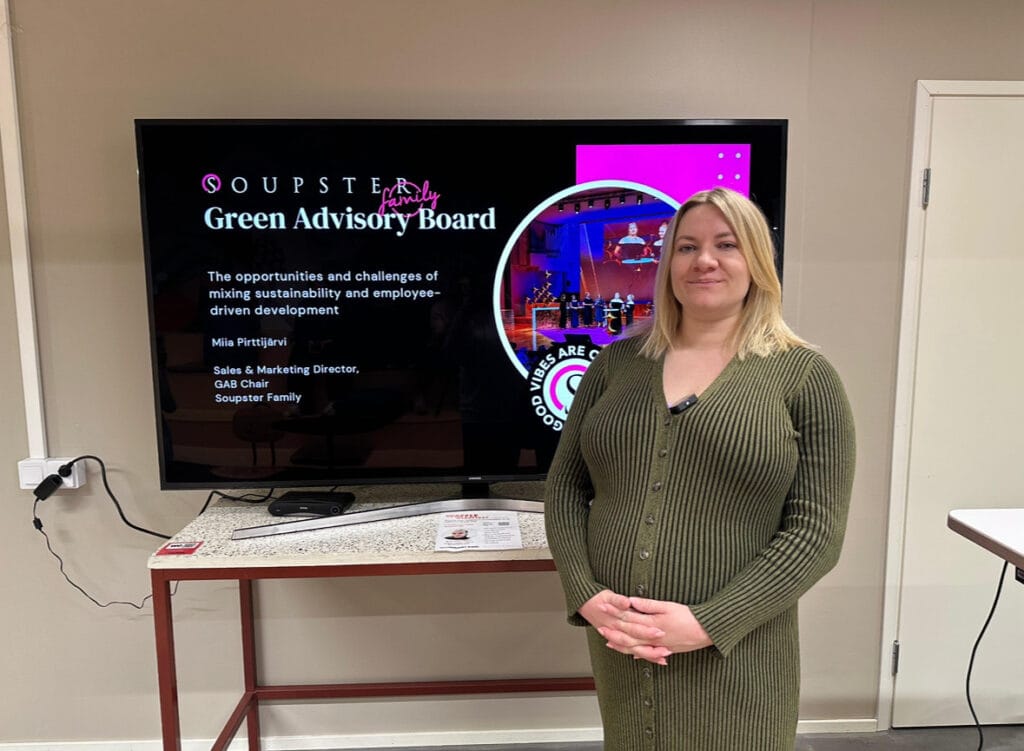One of the latest Waffle Wednesday spotlights featured Miia Pirttijärvi, Head of Sales and Marketing at Soupster and current Chair of the company’s award-winning Green Advisory Board (GAB). Miia shared how Soupster’s journey toward sustainability has been shaped from the inside out, driven by employee initiative and commitment.
What is Soupster?
Soupster is a restaurant and hospitality group operating in Helsinki, Tallinn, and Benalmádena, Spain. With around 50 restaurants (mostly in the Helsinki metropolitan area), event venues, catering services, and even Wonderland Coworking spaces, Soupster has a wide footprint in the industry.
Beyond restaurants, they also provide hospitality consulting, though their “bread and butter” is still food and dining experiences. The group employs roughly 500 people, with an estimated turnover of about €25 million. What really stands out is how they’re channeling that scale into sustainable practices, guided by their people.
What is the Green Advisory Board (GAB)?
The Green Advisory Board (GAB) is Soupster’s employee-led sustainability board, bringing together chefs, waiters, administrators, and more. Its mission: to improve both environmental and social sustainability in ways that make sense for daily operations.
The group meets monthly to brainstorm, share ideas, and turn them into action. Founded about five years ago, GAB grew from a simple question: how do we engage employees in sustainability? It has since become part of Soupster’s culture, aligned with their values of fun, caring, and continuous development.
Miia’s MBA research played a key role in shaping the framework. She started by asking employees how much sustainability mattered to them. The answer was clear: they wanted to be involved. From there, workshops led to the creation of GAB’s operating model, ensuring ideas wouldn’t just stay on paper, but actually become reality.
Why GAB?
At Soupster, constant development is more than a value—it’s a mindset. Since employees are the ones carrying out sustainability work every day, it only makes sense for them to help design and drive it.
Anyone can join GAB, and diverse perspectives are essential. For example, a chef might know best how to reduce food waste, while administrative staff may see opportunities in process efficiency.
How does GAB Work?
Ideas often come from employees noticing opportunities in their daily routines, reading about new practices, or brainstorming together. Each idea is evaluated based on resources, timeline, and environmental impact.
Execution and measurement are done collaboratively between the board, restaurant teams, and administration. GAB also organizes two yearly activities such as study visits or leisure trips to keep members inspired and engaged. Importantly, participation is fully paid work time, underlining Soupster’s commitment to sustainability.
Opportunities and Challenges
For GAB to succeed, both management and employees must be committed to sustainability and open to change.
The challenges:
- Resources: time, money, and expertise are always limited.
- Knowledge gaps: enthusiasm can outpace technical expertise.
- Recruitment: people may assume they need to be “experts” or worry it’s too time-consuming.
The opportunities:
- Stronger employer branding and reduced staff turnover.
- Greater ownership and engagement, since employees drive change themselves.
- Insights from those with the best field knowledge—the people working directly in restaurants.
- Reduced resistance to change, as employees act as “field agents” of sustainability rather than just following top-down rules.
For many members, especially younger employees, GAB also offers a meaningful way to channel concerns about the future into positive, practical action.
What is GAB Doing Now?
GAB currently meets monthly for two-hour sessions focused on brainstorming and project work. Their initiatives cover both environmental and social sustainability.
Recent highlights include:
- Food sourcing: studying the use of domestic ingredients to reduce environmental impact.
- Recycling habits: surveying restaurants and creating new recycling guidelines for staff and customers.
- Sustainability strategy: crafting a company-wide sustainability guide for internal and external use.
- Social sustainability: analyzing employee demographics (nationality, gender, and roles) to understand representation better.
- Mental health awareness: improving access to mental health service information.
- Food waste reduction: partnering with the Natural Resources Institute of Finland on three projects, including EU-backed software pilots to measure and cut waste. Reducing food waste not only lowers environmental impact—it also saves money by improving cost margins.
Looking ahead, GAB plans to recruit more members from different fields to keep perspectives diverse and the momentum strong.
Watch the whole talk here.

